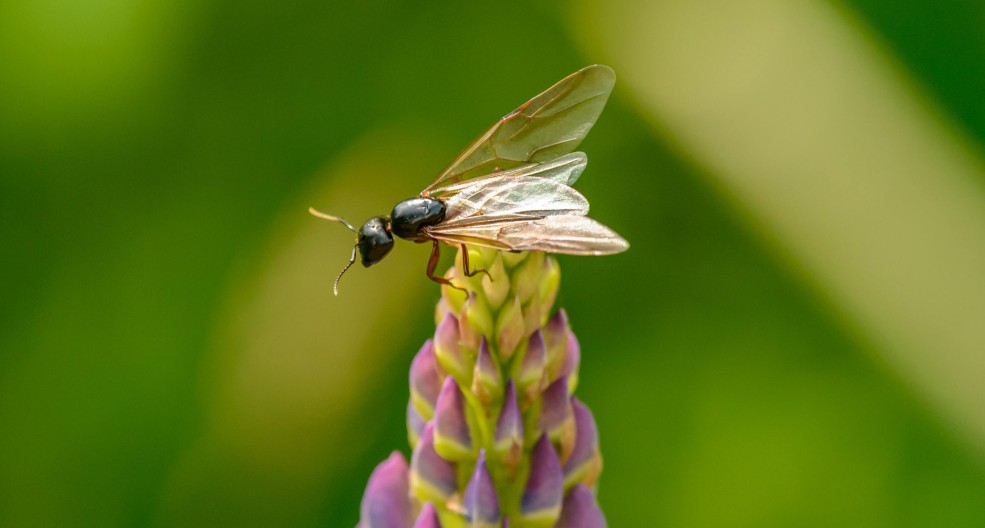Flying ants are young queen ants that have taken to the skies to mate and find a place to live. ‘Flying ants’ is somewhat of a phenomenon since it generally occurs around the same time of the year to increase the chance of finding a mate. This can result in noticeably large swarms. The best way to get rid of flying ants is to avoid them because they will leave your garden of their own accord, normally within a day or two. It’s unlikely that you’ll have flying ants in your home or office, but if you do, you should call a pest control company. Alternatively, you could open the windows and use a peppermint oil spray to entice them to leave.
What are flying ants?

Flying ants, also known as alates, are fertile male and female ants that only leave the nest to breed and find new colonies. Swarms are formed when winged queen ants and male ants from different colonies reproduce in the air.
Flying Ant Day is an annual event that takes place during the summer. Flying ants can be found on any warm calm day in the UK, but most flying ant activity seems to occur during a particular week in July. To learn more about flying ant day read this article.
Why do flying ants suddenly appear?
Flying ants emerge throughout the summer, usually in greater numbers in July. It may seem as though they appear suddenly because often they emerge in swarms, which can be quite large. They only emerge on days where the temperatures are warm and where there is little wind.
When do flying ants come out?
Ants generally emerge from underground chambers during warm weather in the springtime to look for food. During the summer, large numbers of winged queen ants come out to fly and find a mate (commonly known as flying ant day).
Furthermore, ants are most active at night. About 15 minutes after sunset, workers emerge from the nest. They follow chemical trails in search of food, sometimes hundreds of feet from the nest, and often produce permanent, well-worn pathways through the grass, similar to cow paths.
After working, workers return to the nest to rest and socialize with other members. During the day, ants tend to be more solitary than at night. In fact, ants may spend the daytime resting on logs or stones rather than returning home.
How to get rid of flying ants in the wall cavity?
If you notice flying ants in the walls of your house, you can use these tips to get rid of them:
- Remove any debris around the outside of your house. If you have a lot of leaves, grass clippings, or wood chips lying around, this will attract flying ants.
- Clean up any food scraps or pet waste around your property. Make sure that trash cans are emptied regularly and that garbage bags are sealed tightly.
- Seal cracks and holes around your home. Cracks may allow flying ants to enter your home in search of a place to set up a colony
- Spray insecticides. Insecticide sprays work well against flying ants. If you see flying ants, you may spray them to kill them.
What do flying ants eat?
Flying ants don’t eat much. Ants have wings for a few days while they mate, and during those days, they are called flying ants. After the mating is complete, the female flying ants tear off their wings and become normal queen ants, and the male flying ants will die.
How long do flying ants live?
- Queens will live about 15 years
- Males live only a week – just enough time to mate with a queen
- Worker ants live about 430 days.
Why do flying ants shed their wings?
The queens who have become impregnated will chew their wings off after their nuptial flight because they don’t need them anymore. During “flying ant day,” you will frequently observe huge ants flying around, and you might even notice discarded wings strewn across the sidewalk. This simply means that a queen ant was there and she’s gone to find a place to start laying eggs and building her colony.
What happens if you don’t remove ants?
Depending on the type of ant, you might get bitten. For example, common red ants bite. Normally, it’s black ants that like to enter homes. Black ants don’t bite. But they do forage for food and it’s not pleasant having a colony of ants running around your kitchen and finding them in your food. If you don’t get rid of them the problem may spread as the queen continues to lay eggs.
One ant to really watch out for is Pharaoh ants. Pharaoh ants carry diseases, but thankfully they are not very common. If you have Pharoah ants it would be best to throw out your food to avoid getting sick. Pharaoh ants also have a nasty bite so best to call in the pros.

